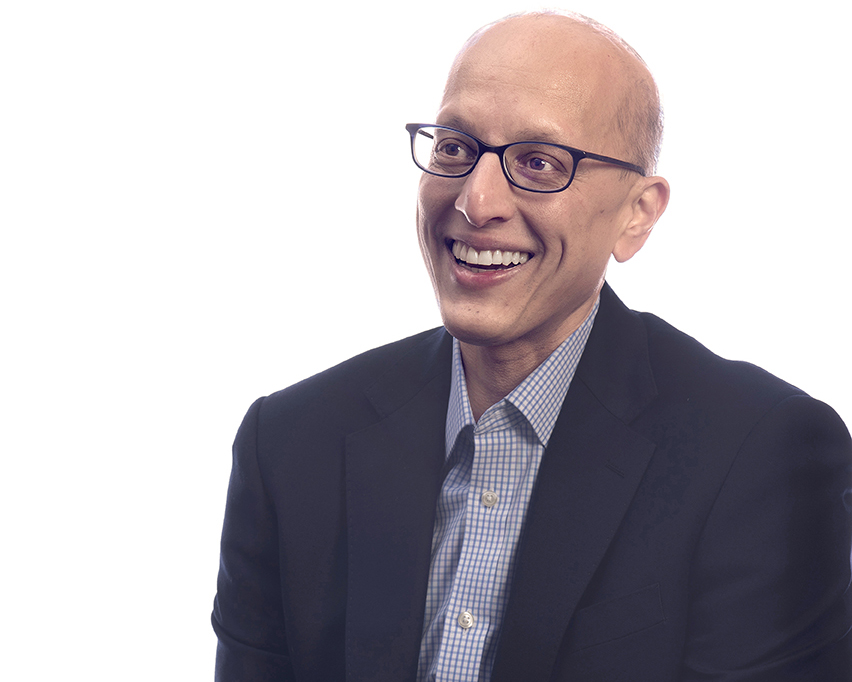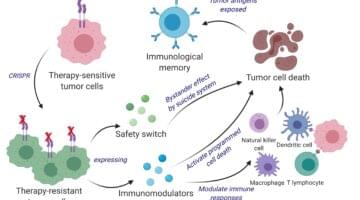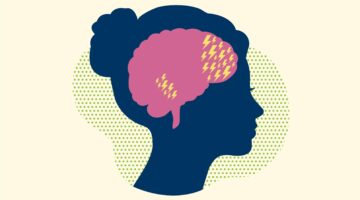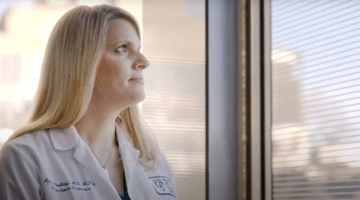
Executive Director, Center for Healthcare Delivery Sciences, Division of Pharmacoepidemiology and Pharmacoeconomics, Brigham and Women’s Hospital
Professor of Medicine, Harvard Medical School
(Photo by Stu Rosner)
What is the focus of your research?
I am interested in how people make decisions about their healthcare. Our team is particularly focused on understanding why people sometimes do not take their medications as prescribed.
Why is this a problem?
It’s like our general challenge adopting other healthy habits like diet and exercise. We all know we should, but many of us don’t. I call this the know-do gap: the gap between becoming aware that you should do something that’s important for your health, like taking medication, and choosing not to do it. That’s the space where we work—in all the messy details of our lives that get in the way. This isn’t about us telling people what to do. It’s about supporting them against all the barriers they face, from simply forgetting to worrying about cost and access. Some people don’t know what barriers are in their way.
What was your first big success?
We have solid evidence that certain medications prevent heart attacks. We also know the cost of medications keeps many people from taking them. So we pitched an idea to a health insurer, Aetna, to let us study if adherence rates go up if insurance covered the full cost. We randomized 6,000 people who had a heart attack to either pay for the drug through their regular plan or receive the drug at no cost. The rate of medication adherence increased in the free-drug group and, with it, a decrease in their number of heart attacks, strokes, and readmissions. The results left patients with more money in their pockets while making their lives better.
When taking medicine is hard or uncomfortable, we need something to motivate us. Being around for family is a big priority for many.
What did that experience teach you?
This trial taught me it’s possible to do this sort of rigorous research in a health insurance system. The study also cost a fraction of studies done in more traditional settings. It also convinced Aetna to reduce, and in many cases to eliminate, the costs that patients pay for their heart medications.
Where do you find inspiration for behavioral studies?
We often get inspiration for our projects from work done in other industries. For example, I was fascinated by a finance industry experiment to motivate people to save money. They randomized a group of bank customers so half received a bank book with a photo of a close family member on the cover. Lo and behold, the photos led to better savings compared with customers who got a plain book. Could you imagine putting a picture of someone’s loved one on a pill bottle? When taking medicine is hard or uncomfortable, we need something to motivate us. Being around for family is a big priority for many. Those are the sorts of human-centered experiments we’re interested in trying.
How can devices help improve health behaviors?
We’re already seeing it with phones that track physical activity. Phones use an accelerometer to tell you the speed and distance you’ve traveled. We can now use accelerometer data and message users when they are doing a good job to motivate them to stay active. Technology could also help us with many health behaviors, including taking medications, keeping our doctors’ appointments, and remembering to get vaccinated. But these technologies need to be smarter than they are today—each of us is unique and what we need to motivate behavior is highly personal. That’s where the next big thing is: delivering precision interventions at population scale.
What’s next on your agenda?
Changing behavior isn’t easy, and it isn’t fixed by one thing, but by a combination of strategies. Financial incentives, reinforcement from friends and family, reminder devices, coaching, contracts—we are studying these motivators within health insurance systems to see which are most promising for helping people manage their conditions.
What motivates you to keep going?
Having good health makes all aspects of life better. If my research can help people form sustainable habits that improve their lives, that would be a major contribution.
Whose behavior is harder to change, doctors or patients?
Doctors, for sure. Patients are tough, too. All human behavior is hard to change, including my own!










